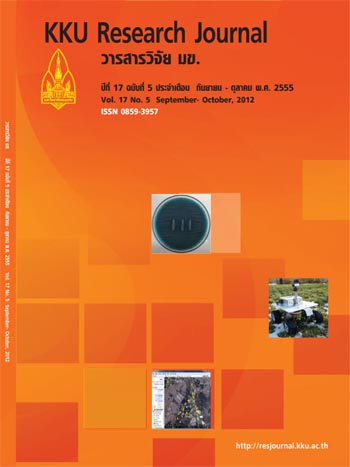Conidial production of entomopathogenic fungi in solid state fermentation
Main Article Content
Abstract
Six naturally collected entomopathogenic fungal isolates were grown on five cereal grains; rice, wheat, rye, corn and sorghum, as solid inoculum in order to measure the linear growth, spore production, and their pathogenicity. Among the grains, corn gave the highest growth rate and rye showed poor mycelium growth for all isolates except Paecilomyces lilacinus CMUCDMT02. In all grain substrates, P. lilacinus grew significantly faster than the others. Isaria tenuipes CMUCDMF02 and Beauveria bassiana CMUCDMF03 produced fruiting bodies on corn and sorghum 15 days after inoculation. Spore productivity on sorghum yielded the maximum amount of spores for P. lilacinus CMUCDMT02 and Metarhizium flavoviride CMUCDCT01 whereas rice yielded the greatest amount of spore for B. bassiana CMUCDMF03. Germination at 48 hours was over 80% for all isolates that had been incubated for 60 days. Among all tested isolates, pathogenicity of P. lilacinus was highest against Bactrocera sp. (1×106 spore/ml). The data from this experiment could be employed for the mass production of entomopathogenic fungi for biological control purposes.
Article Details
How to Cite
Mar, T. T., & Lumyong, S. (2017). Conidial production of entomopathogenic fungi in solid state fermentation. Asia-Pacific Journal of Science and Technology, 17(5), 762–768. retrieved from https://so01.tci-thaijo.org/index.php/APST/article/view/83285
Section
Research Articles


